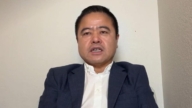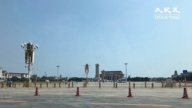【新唐人2012年1月17日訊】中共國務院總理溫家寶15號在出訪沙特阿拉伯時表示,支持「阿拉伯之春」人民變革訴求,溫家寶的談話引起外界極大的關注。
15號,在與伊斯蘭合作組織秘書長伊赫桑奧盧(Ekmeleddin Ihsanoglu)會談時,溫家寶表示,中方「呼籲停止一切針對平民的暴力行為,支持有關國家人民的變革訴求。」他希望「並且相信地區國家的政府和人民,有能力解決自己的問題。」
溫家寶的講話雖然簡短,但這是阿拉伯世界爆發「茉莉花革命」一年以來,中共官員唯一公開表達支持阿拉伯人民的變革訴求。
溫家寶這番言論是官話?還是真心話?在目前的國際形勢下又包含著甚麼意思?引發各界極大的關注和解讀。
香港《動向》雜誌主編張偉國認為,這顯然是官話。
張偉國:「他現在是在國外訪問,那麼他的言行都是代表了中國政府的外交。因為阿拉伯已經變天了,新的政府中國還要打交道。如果不承認的話,就是意味著和這些新政府沒辦法建立正常關係。所以這個應該講是一種官話。」
溫家寶這次出訪沙特、阿聯酋、卡塔爾正好是西方國家加緊制裁伊朗的時刻, 伊朗目前是中國第三大原油供應國,僅次於沙特阿拉伯和安哥拉。根據美國能源情報署的數據,2010年,中國是伊朗石油最大的出口市場。
美國希望獲得中國支持,削減從伊朗購買石油,由於歐盟和其他國家也願意考慮大幅削減進口伊朗石油,如果中共還試圖保持與伊朗的關係,那麼就將處於與西方大多數大經濟體對抗的境地。因此,溫家寶這次訪問中東三國,也被看作是中共為解決能源供給而走的新佈局。
《紐約時報》14號說,中共上週斷然拒絕參與美國發起的制裁伊朗行動,並要求就伊朗核計劃問題舉行更多談判。
「美國紐約城市大學」政治學教授夏明認為,溫家寶的講話中也透露出中共的這一態度。
夏明:「他講的其他外國不要捲入,那麼也就是說他其實是針對美國的,針對西方國家,尤其是北約那個組織的。我覺得他第二個意思就在於,他是反對西方國家對第三世界國家的干預,因為這個直接對中國形成一種威脅。」
夏明教授分析,溫家寶還想暗示,中共當局有能力解決國內社會矛盾。但卡扎菲和穆巴拉克,以及敘利亞目前的情況已經證明,顯然獨裁政權是無法解決這個問題的。
夏明:「中國目前,我們看到烏坎也死了人,西藏這邊的藏人,過去一年就有16起自焚事件現在已經發生了。溫家寶他如果要向國際社會表明,或者如果能夠說服國際社會,中國能夠解決這些問題的話,那麼我想首先這些悲劇,這些自焚悲劇,和這些殺人的悲劇,那麼首先就應該制止。我覺得這一點恐怕是最關鍵的。」
溫家寶還說,中共與伊斯蘭合作組織在維護西亞、北非地區和平與穩定方面有著共同利益。夏明教授認為,雖然雙方在抗衡西方話語體繫上可能形成統一,但認為「天下穆斯林都是一家」的伊斯蘭教國家,和鎮壓、虐待中國伊斯蘭教徒的中共,在宗教層面的衝突,將是雙方合作中巨大的挑戰。
新唐人記者常春、尚燕、孫寧採訪報導。
Interpreting Wen’s Support of “Arab Spring”
Upon visiting Saudi Arabia on 15th, Chinese Premier
Wen Jiabao expressed support for the “Arab Spring."
Wen’s remarks received great attention from the public.
Wen talked with Ekmeleddin Ihsanoglu, Secretary-General of
Organization of the Islamic Conference.
Wen said China “calls for terminating any violence against
civilians, and supports the efforts of reform in many countries.”
He expressed the belief that regional governments have the
ability to solve their own problems.
In the past year after Arabian world’s “Jasmine Revolution”, this
is the first time that Chinese officials publicly expressed support.
Is Wen’s remark formulaic diction or sincere expression? What
does it indicate in the current international situation?
Wen’s words have given rise to great concerns and interpretations.
Zhang Weiguo, chief editor of Hong Kong magazine “Trends",
takes it to be ideological term.
He is now on a diplomatic visit to these countries.
His words and deeds naturally represent Chinese government.
Now the Arabian world has undergone sweeping changes.
If China refuses to recognize this change, it cannot establish
normal relationships with them. So this is only diplomatic diction.
Wen visited Saudi Arabia, UAE, and Qatar when
Western countries strengthened boycott against Iran.
Iran is now China’s third largest crude oil supplier, following
Saudi Arabia and Angola.
According to U.S. Energy Information Administration,
China is Iran’s largest oil export market in 2010.
U.S. asked China’s cooperation to reduce purchasing oil
from Iran.
When EU and U.S. reduce oil imports from Iran,
China would be opposing them to cooperate with Iran.
Therefore, Premier Wen’s visit to the Middle East is seen
as CCP’s new energy strategy.
The New York Times said on 14 that CCP firmly refused to
participate in the U.S.-initiated boycott.
Requiring more talks over the Iranian nuclear issue.
Xia Ming, professor of political science at City University of
New York, said Wen’s speech revealed such an attitude of CCP.
Wen stressed that other countries should not get involved.
He is actually referring to the U.S., other Western countries, and NATO.
I feel he also indicates opposing Western countries’ intervention
in the Third World countries, which directly threatens CCP’s rule.
Professor Xia Ming also says, Wen wants to suggest that Chinese
authorities have the ability to solve domestic social conflicts.
However, Gaddafi, Mubarak, and the current situation in Syria
demonstrated authoritarian regimes can not solve the problems.
Now we’ve seen that some people died in Wukan;
last year saw 16 Tibetan self-immolations.
To convince the world of its ability, CCP first needs to solve
the problems behind these tragedies.
I think this is probably the key issue.
Wen also said CCP shares common interests with Islamic
Cooperation Organization in maintaining peace in West Asia and North Africa.
Prof. Xia believes that although both sides compete with the West,
CCP persecutes Muslims within China.
Religious conflicts will significantly impede their cooperation.
NTD reporters Chang Chun, Shang Yan and Sun Ning




























